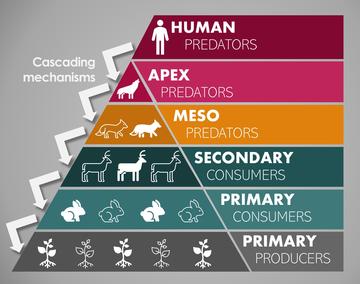
The different trophic levels of a food web interact with each other, in this case through 'top-down' pressure which cascades throughout the food web.
Image: Robert Montgomery
The European Research Council (ERC) has awarded a €1.9 million Consolidator Grant to Dr Robert Montgomery, for research investigating the effects of human predation on the group dynamics of large mammals. These grants enable scientists leading independent research to strengthen and expand the impact of their work.
The project will explore the ways in which humans structure animal community dynamics via top-down pressures (i.e., caused by species at the top of the food web). Dr Montgomery’s research will explore these effects among large mammals including both ungulates, such as kob, and carnivores, such as lions. The work will take place in Uganda, where these species are vulnerable to human subsistence poaching, and will pursue two knowledge gaps; first, whether large mammals have evolved defences to human predation, and second, whether the threat of human predation can trigger cascading impacts which alter the structure of food webs.
Dr Montgomery said:
Though food webs dynamics research has been a cornerstone of ecological inquiry for over a century, the effects of human predation, situated at the very top of trophic systems, are not well understood. This research will make substantial contributions to ecological and evolutionary ecology by quantifying the consequences of human predation effects on ungulate prey and on large carnivores that humans are uniquely capable of turning into prey.
The impact humans have on the natural world is widely discussed, but we still don’t fully understand the mechanisms through which this impact is made. This research will help to unravel these key dynamics, and will generate principles that have wider implications for the conservation and management of animal populations. Dr Montgomery’s project will also support the training of 20 Ugandan students and scientists in this collaborative research expanding the equity, diversity, and inclusion of scholars engaged in ecology and evolution research.